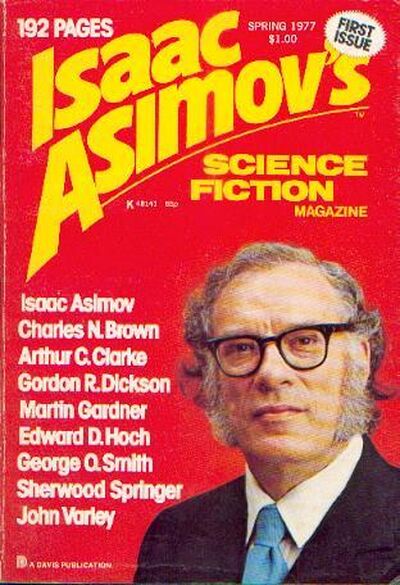Closed On The Shelf
Isaac Asimov’s Science Fiction Magazine, Spring 1977
Edited by George H. Scithers

5 Jan, 2025
Isaac Asimov’s Science Fiction Magazine, Spring 1977 was the debut issue of Isaac Asimov’s Science Fiction Magazine. The editor was George H. Scithers, with Asimov providing the name of the magazine and editorial columns.
Asimov’s is still being published, five editors1 and almost half-a-century later. What did that first issue look like?
Alas. George H. Scithers had conservative ideas about what would sell. This is a comparatively squeaky-clean issue. It is also not very daring. One could even say “disappointing and minor, with few standouts.” I prefer “remarkably unremarkable.”
The stories by the biggest name authors (Clarke, Asimov) are the slightest. The standouts are the two Varleys.
What did catch my eye were the ads. There’s an ad from Ace Books, offering forty classic SF novels for just $9.95!


I wonder which forty books those were? I have no memory of this offer at all.
There’s also one from Asimov’s itself offering authors on LP. Imagine being able to listen to a story simply by placing a handy disk on the Victrola before ordering the servants to start shoveling coal into its firebox!

I did once have a story-on-phonograph disc, but I don’t think it was from the same company as the ones Asimov’s offered.

Asimov’s also offered discount books. I’d love to know the details on that as well.
Ah, well. I’ve reviewed Disco-era Analog, Galaxy, Destinies, and Galileo. Now I can add Asimov’s. The issue isn’t memorable save in one respect: it launched what is now one of the deadtree Big Three. That is not nothing, especially when you consider that Galaxy, Destinies, and Galileo died soon after the issues I reviewed.
As Asimov’s Spring 1977 is a magazine, it is long, long out of print.
Art is by Rick Sternbach, Alex Schomburg, and others not identified.
Now about the stories…
Editorial (Asimov’s, Spring 1977) • [Asimov’s Editorials] • essay by Isaac Asimov
A lengthy piece from Asimov, explaining the genesis of the magazine, and his intended role in it. Asimov is quite clear that Scithers is at the helm.
The parallels here are with Ellery Queen’s Mystery Magazine and Alfred Hitchcock’s Mystery Magazine, which also bear a famous person’s name as part of the title of the magazine. Seems to work, as the three magazines named above still exist.
I should add that while Davis Publications sought out Asimov, Ellery Queen’s Magazine was founded by the men behind the Ellery Queen pen-name, Frederic Dannay and Manfred B. Lee.
Good-Bye, Robinson Crusoe • [Eight Worlds] • novelette by John Varley
An expert on vacation resists efforts to make him resume adulting.
As discussed elsewhere, one of Varley’s go-to utopian plots was “what I did on my vacation.” This would be an example.
I always confuse this one with Gene Wolfe’s The Death of Doctor Island… which I often confuse with Gene Wolfe’s The Island of Doctor Death and Other Stories, as well as Wolfe’s The Doctor of Death Island.
“The Doctors’ Dilemma” • [SF Puzzles] • short story by Martin Gardner
A puzzle story about avoiding contamination during an epidemic.
Oddly enough, I had a similar situation come up at work.
“Think!” • short story by Isaac Asimov
Advances in brain-monitoring technology yield astonishing results.
“Quarantine” • short story by Arthur C. Clarke
What dreadful contagion demanded Earth’s destruction?
“The Homesick Chicken” • short story by Edward D. Hoch
Why did the genetically-enhanced chicken cross the road?
I think this was supposed to be funny. The eventual explanation takes too long to arrive and is very contrived.
“Perchance to Dream” • short story by Sally A. Sellers
A woman struggles to escape the dreadful curse of immortality.
This seems to be Sellers’ only story or at least the only one recorded at ISFDB.
“On Our Museum: A Preview of the New Smithsonian” • essay by George O. Smith
A rapturous accolade to the Smithsonian.
“Air Raid” • short story by John Varley [as by Herb Boehm]
The horrifying damaged humans of the future snatch doomed people out of history in a bid to save humanity.
This would be Varley in pessimist mode. Also, in a Heinleinist mode, as the involuntary colonists will be stuck with 19th century gear because there seem to be people who think the 19th pioneers used that stuff because it is optimum and not because it was the best they could get at the time.
“Kindertotenlieder or Who Puts the Creamy White Filling in the Krap-Snax?” • short story by Jonathan Fast
Resolute children fake their deaths to earn a suitable reward from their media-star hero.
This is also a funny story. I think.
“Period of Totality” • short story by Fred Saberhagen
Survival depends on accepting that a woman scientist could be correct.
In the men’s defense, the model presented is counterintuitive and poorly explained. But she is still correct.
“The Scorch on Wetzel’s Hill” • short story by Sherwood Springer
What could explain a local hill’s sudden barrenness? \
“Coming of Age in Henson’s Tube” • short story by William John Watkins [as by William Jon Watkins]
Young idiots in an O’Neill colony test the theory that fortune protects the foolish.
This is one of those coming-of-age traditions that prevails because the people who die trying it are not around to explain why it is a bad idea.
“On Books (Asimov’s, Spring 1977)” • [On Books] • essay by Charles N. Brown
Brown reviews Children of Dune by Frank Herbert, Imperial Earth by Arthur C. Clarke, Man Plus by Frederik Pohl, Where Late the Sweet Birds Sang by Kate Wilhelm, Cloned Lives by Pamela Sargent, The Long Arm of Gil Hamilton by Larry Niven, My Name Is Legion by Roger Zelazny, The Word for World Is Forest by Ursula K. Le Guin, The Space Machine by Christopher Priest, The Turning Place by Jean E. Karl, Triton by Samuel R. Delany, O Master Caliban! by Phyllis Gotlieb, Maske: Thaery by Jack Vance, The Shattered Chain by Marion Zimmer Bradley, Dragonsong by Anne McCaffrey, A World Out of Time by Larry Niven, The Light Fantastic by Alfred Bester, Star Light, Star Bright by Alfred Bester, and The Craft of Science Fiction by Reginald Bretnor.
It’s an impressive number of books to review. Page count limits prevented detailed reviews for many of them.
Time Storm • novelette by Gordon R. Dickson
A determined man quests across a time-tossed America to rejoin his lost girlfriend.
Not really my thing. Later expanded into a novel that was also not my thing, but at greater length.
1: George H. Scithers (1977 – 1982), Kathleen Moloney (1982 – 1983), Shawna McCarthy (1983 – 1985), Gardner Dozois (1985 – 2004), and Sheila Williams (2004 – TDB). I remember the McCarthy era as much longer than it actually was.
